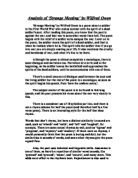Irony is again displayed on a broad scale in the relief that war was worst than hell, and therefore they don’t mind being there as even there they can “sleep”, unlike in war.
3. What is gained by casting this subject as a dramatic encounter between a dead man and the man who killed him? (Are both men dead? Explain why you agree / disagree?)
The poem gains intensity and increases the tone of irony when the dead soldier meets the man who killed him. It seems that both men are dead, however it is not clear whether this is reality or just a dream.
The poem explains, how both men went “hunting wild” after war; “the wildest beauty in the world”, not knowing how cruel and tough war was like. Neither they knew that war “mocks the steady running of the hour”, meaning that during war, time becomes irrelevant as it seems to never end. That’s why dying was a way to “escape” from “battle” and that even though they are now in “Hell” they can “sleep”, as grieve is richlier in war. All this, together with the description of the “undone years, / The hopelessness”, helps us to understand how both men died, but that even death is better than being fighting in war.
4. What does the dead man mean when he refers to “the wildest beauty in the world”?
The man means that he went, not forced, to war without knowing how war was really like. This suggests the idea that men were lay, and that they were told that fighting in war was a honourable thing to do.
“Wildest” suggests that death was inevitable for those who went to war, as they were not really prepared for its cruelty. Overall, it seems to describe how war is the shortest way in the world, to ensure death.
5. What had been the ideals, abilities and ambitions of the man killed yesterday? What about the narrator of the poem?
These soldiers were tricked to fight in war. They were told war was much different than reality and thus, these soldiers wanted to transmit the “pity of war” and reveal “the truth untold” through words. However they are not able to do so now as they are death, and they are hopeless as they won’t be able to express themselves and explain how war is really like.
6. What does the dead man mean by "the pity of war"? What does he predict for the future of Europe / humankind / civilisation? What aspects of this prophesised future does he lament?
‘The pity of war” defines how many men were killed and how there death are useless because another war will be held as the looser won’t be satisfy with the results of war. Therefore “pity’ stands for the useless sacrifice of humans lives during war.
The man also predicts that nations will “trek from progress” as they will continue to sacrifice more human lives to the point where we will all become uncivilized people fighting instead of discussing and killing instead of listening.
7. Look at the lines: “Courage was mine and I had mystery…………Into vain citadels that are not walled. ”What do you think the dead man intends to convey?
Mystery is a story about crime (usually murder) that’s why the narrator explains that he had “courage” to fight and as a result he had “mystery” as the only way to survive was by killing the “enemy”.
However, the narrator also claims to have had “wisdom” and had the knowledge for keep on fighting and avoid “retreating” and hiding inside “vain citadels” that weren’t walled anymore meaning that even those who hide in the citadels were not safe from the cruelty of war and death.
Therefore, I believe the dead man tries to convey irony, by explaining that no matter whether somebody fought or escaped and hide, the result was going to be the same (death) as nobody was safe during war. Which basically means that innocent people would also die during war.
8. What do you think is meant by: “Foreheads of men have bled where no wounds were”?
The above quotation suggests that these people are no longer able to transmit their experiences, which could have taught many others what was war like and how useless and cruel it is.
9. Who has the last word, and why is this important? Why had the dead man not fought to the death?
Does this make a correction to the notion of valour in battle?
The soldier, who “sprang up” from the dead bodies pile, is who has the last word. This is important because it explains that the soldier knew that the man, whom he was talking to, killed him.
War was long and seemed to never-end, he might have been tired and week by the time he fought with this other soldier. Additionally, this changes the notion of valour in battle. It seems that it was no longer a matter of courage, but a matter of wisdom. The wiser one would prefer to die and rest while the brave one will keep on fighting and suffering. Consequently courage becomes in masochism to some extent.
10. Is the final tone one of forgiveness / peace / reconciliation? Does the poem achieve closure?
The end does have a tone of forgiveness and reconciliation as one of the dead soldiers explains to the other one that he is the “enemy” killed and calls “friend” to his ‘murderer’. Further more, this soldier decides to leave the past in the past when he suggests to “sleep now…”
The poem however doesn’t achieve closure due to the suspension dots, which suggests that something might happen afterwards.








